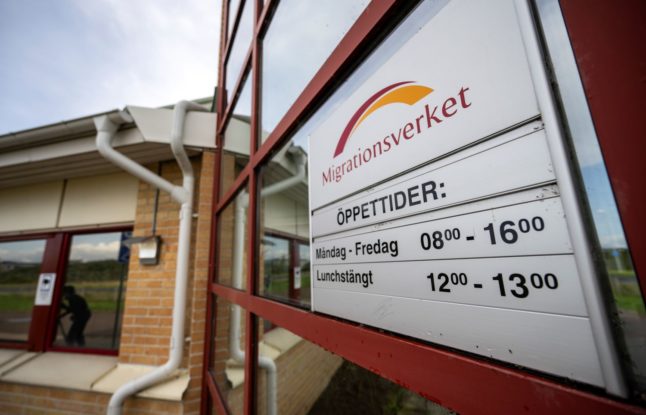For one couple from Argentina, the changes caused by the coronavirus have completely upended their plans.
“We took the decision [to move to Sweden] last year after having done a lot of research within countries that offer Working Holiday visas to Argentinians. Sweden got our attention because of its good economy and life standards. Also its cultural idiosyncrasies are different to ours and we wanted to live it,” Federico told The Local.
RECOMMENDED:
-
Follow the latest updates on the coronavirus crisis in Sweden (paywall-free)
- Here's what you should be doing to help reduce the spread of the virus (paywall-free)
They had both secured jobs — Federico at an RV rental company and his wife at a hotel chain — and had settled into their new apartment.
“I got the news that my job was cancelled before it even started. It was a sad moment as I was really interested in this opportunity. But it wasn't that bad as my wife's work was enough for pay the rent and anything we could need. Also they had offered a working visa for when our Working Holiday [visa] will be expired. Then, one day they started to cut hours, and then she got a notice of ending of her contract as business was going really bad in the hotel.”

The hotel branch has been particularly hard hit. Photo: Lars Pehrson / SvD / TT
“My wife's boss told her that as soon as this situation ended, they will hire her and help with our papers. The problem is the meantime and the lack of notice from our country. The people at the embassy are pretty nice but powerless as the government of Argentina has forbidden any flight. And the sensation is that they don't want us back.”
A reader from Bangladesh, who asked to remain anonymous, had been working as a permanently employed steward at a major hotel chain in Sweden for two years when he received similar news. He is still working out what applies in his situation.
“My employers have signed a re-employment paper with me that indicates I will given priority to get back my job when I apply to a job post [once business starts to improve] and that document of re-employment will be valid for nine months after I have been laid off,” he said.
He was not entirely happy with his employer's reaction, but also had concerns about the response of the Migration Agency to the crisis.
“According to the current law, if I'm laid off from the job through which I have my work permit, I have to find another job within three months after being laid off and apply for a new work permit within that three months. But the thing is, I haven't been laid off because of my faults or the employers' faults, it the situation because of coronavirus and moreover there is a job crisis in the market now,” he explained.
“My humble request to the government is that they should consider the situation and relax the law, so that we can get extended time to search for a new job or get back to our previous job.”
And another reader, who moved from Sweden to India in 2015, was also worried about the impact on his permit after being laid off from a job he started in February.
“I was given one month's notice by my employe on March 16th because they are going to lose client projects due to Covid-19 and the economic crisis. Since I am new in the company and in my probationary period, I was one of the few people who were the obvious ones to get laid off.”
“Right now I am searching for opportunities in Sweden. But it's unlikely I will find a job for at least two months, and since my work permit is valid until July 16th, it's going to be a stressful time for me. I also talked to a couple of managers from a few IT companies, and they informed that they were not recruiting anyone right now and they didn't know how long will this hiring freeze is going to continue.
The Migration Agency must consider this as an extraordinary situation and give people with work permits more time to search for new jobs.”
The Migration Agency states on its website that “there are currently no specific rules covering the consequences of the coronavirus”, confirming that laid-off work permit holders have three months to find a new job, and when The Local approached Sweden's Justice Ministry for more information last month, we were told that no extra legislation was planned.
 Across the country, everyone has been asked to work from home if possible and limit social contacts, and many companies are struggling due to reduced demand. Photo: Melker Dahlstrand/imagebank.sweden.se
Across the country, everyone has been asked to work from home if possible and limit social contacts, and many companies are struggling due to reduced demand. Photo: Melker Dahlstrand/imagebank.sweden.se
However, the ministry did say: “It is correct that someone who has been granted a work permit and is made redundant can stay in Sweden for three months and apply for a new job. If the person does not find new work within three months the permit can be recalled, but that is a question of how the rules are applied, which is handled by the Migration Agency.” This suggests that the agency has the authority to take extraordinary circumstances such as the coronavirus into account.
The same applies to work permit holders who are affected by reductions in salaries and hours due to the pandemic, which might mean they no longer reach the thresholds required to be eligible for a work permit.
Of the people who were granted work permits in 2019 alone, 1,141 worked in fast-food and food preparation, and 1,045 worked as cooks.
“The corona situation has affected the whole country in many different ways. Many foreign workers got laid off or got reduced working hours along with their Swedish colleagues. None is breaking any law, nor is any employment condition being violated,” Rafiqul Islam, general secretary of the Work Permit Holders Association, told The Local.
“Technically, this puts foreign workers in a situation that they may not get their permit extended if they cannot find a job within three months from the day of their termination or cannot get the exact salary which was promised in their employment contract.
“In the coming three to four months, it will be nearly impossible for anyone to find a job regardless of whether they are a Swede, EU, or non-EU citizens. If the government and the Migration Agency do not become flexible then many people with their children will be forced to leave Sweden and face uncertainty.”
Asked which measures the association hoped to see, he said: “During this economic crisis, everyone is looking for economic support from the government. But the foreign workers are not waiting for it. They can take care of themselves with whatever they have. They only need a little flexibility in the regulation from the government and the Migration Agency. It will cost nothing but a moral attention to the non-EU workers who contributed their labour in this economy.”

An empty Public Employment Service office. Photo: Petra Älvstrand / TT
And it's not only work permit holders who could be affected, but other non-EU citizens who live in Sweden under different kinds of residence permits.
One Indian student at Lund University said that many of their fellow international students had chosen to return home as the outbreak grew more severe. But she had chosen to stay in case travel overseas made it harder to apply for an extension on her permit, especially since she plans to stay in Sweden long-term and find work or further studies here after her Masters.
“I am still here because I do not want to risk being outside Sweden while carrying on Masters studies here to avoid problems with the Migration Agency while applying for an extension on my resident permit, even though my university is carrying out classes and exams online,” she said.
“In this situation, an extension of the resident permit seems like a relatively trivial reason to not be able to go to my home country to be with my family, and a lot of other internationals are upset about the Migration Agency not making any updates in their policies in this extraordinary situation.”
We'd like to say a huge thank you to everyone who took the time to respond to our questionnaire. Although we couldn't include all of the hundreds of responses we received, we read every single one and have included a representative sample of those relating to permit issues here. Your experiences will inform our coronavirus coverage, and you are always welcome to get in touch if you have further feedback, a question or a story to share.
In Sweden, the official advice requires everyone to:
-
Stay at home if you have any cold- or flu-like symptoms, even if they are mild and you would normally continue life as normal. Stay at home until you have been fully symptom-free for at least two days.
-
Practise good hygiene, by regularly and thoroughly washing your hands with soap and water, using hand sanitiser when that's not possible, and covering any coughs and sneezes with your elbow.
-
Keep distance from all other people when in public places. That includes shops, parks, museums, and on the street, for example. The World Health Organisation recommends keeping at least a 1.5-2 metre distance.
-
Avoid large gatherings, including parties, weddings, and other activities.
-
Work from home if you can. Employers have been asked to ensure this happens where possible.
-
Avoid all non-essential travel, both within and outside Sweden. That includes visits to family, planned holidays, and any other trips that can be avoided.
-
If you have to travel, avoid busy times such as rush hour if you can. This reduces the number of people on public transport and makes it easier for people to keep their distance.
-
If you are over 70 or belong to a high-risk group, you should stay at home and reduce all social contacts. Avoid going to the shops (get groceries delivered or try to find someone who can help you), but you can go outside if you keep distance from other people. Read more about the help available to those in risk groups here.
-
By following these precautions, we can all help to protect those who are most at risk and to reduce the rate of infection, which in turn reduces the burden on Sweden's healthcare sector.
- Read more detail about the precautions we should all be taking in this paywall-free article. Advice in English is also available from Sweden's Public Health Agency and the World Health Organisation.



 Please whitelist us to continue reading.
Please whitelist us to continue reading.
Member comments